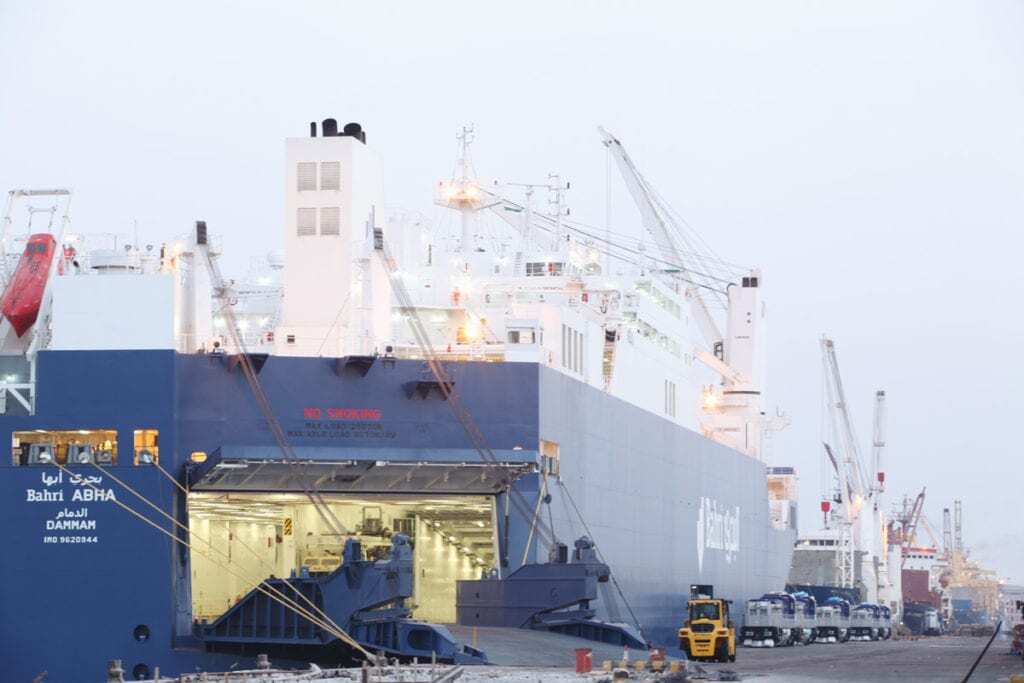Mr. Matthew Luckhurst
Vice President – Liner, Bahri
First of all, tell us a bit about the background of Bahri.
Bahri was established in 1978 as a publicly-listed company and started off as a carrier of general cargo. We later expanded our operations and diversified the company portfolio by foraying into the chemical transportation business in 1990 and oil transportation in 1992. Expanding further, Bahri incorporated its wholly owned subsidiary Bahri Ship Management to offer comprehensive and professional technical management services for all of Bahri’s vessels.
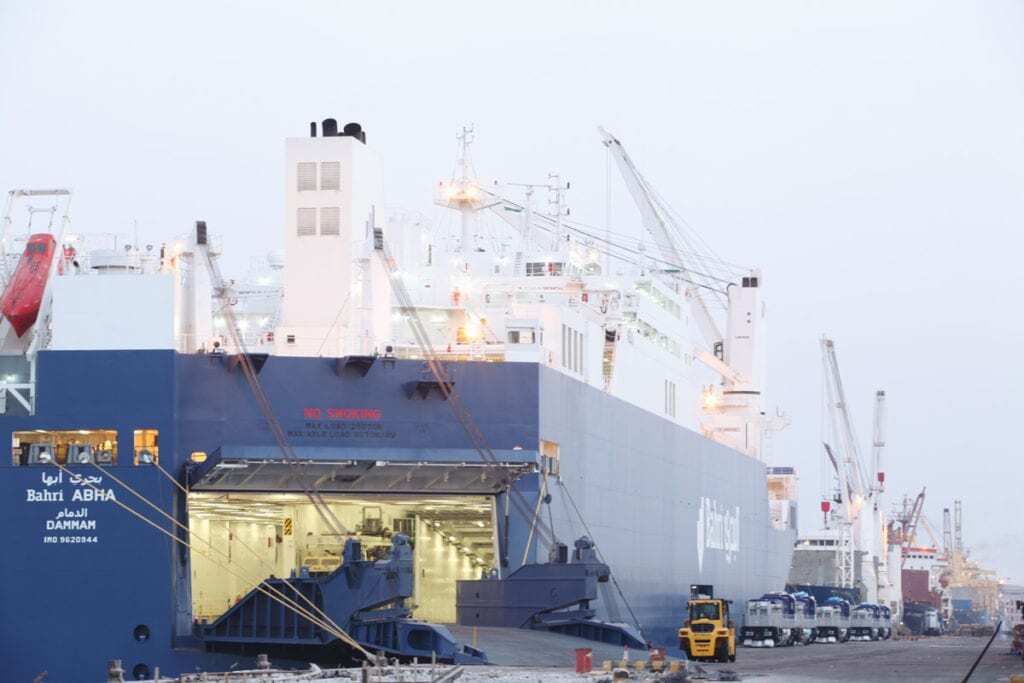
Having started operations with just four multi-purpose vessels, today, Bahri is among the world’s leading and most highly-renowned transportation and logistics organizations, with a diversified fleet of over 87 specialized vessels that transport crude oil, chemical products, general and project cargo, and dry bulk goods.
The company’s prestigious cohort of shareholders includes the Saudi Arabian Public Investment Fund (PIF), Saudi Aramco Development Company, as well as prominent Saudi businessmen and financial institutions.
Bahri has six business units that include Oil, Chemicals, Logistics, Dry Bulk, Ship Management and Data.
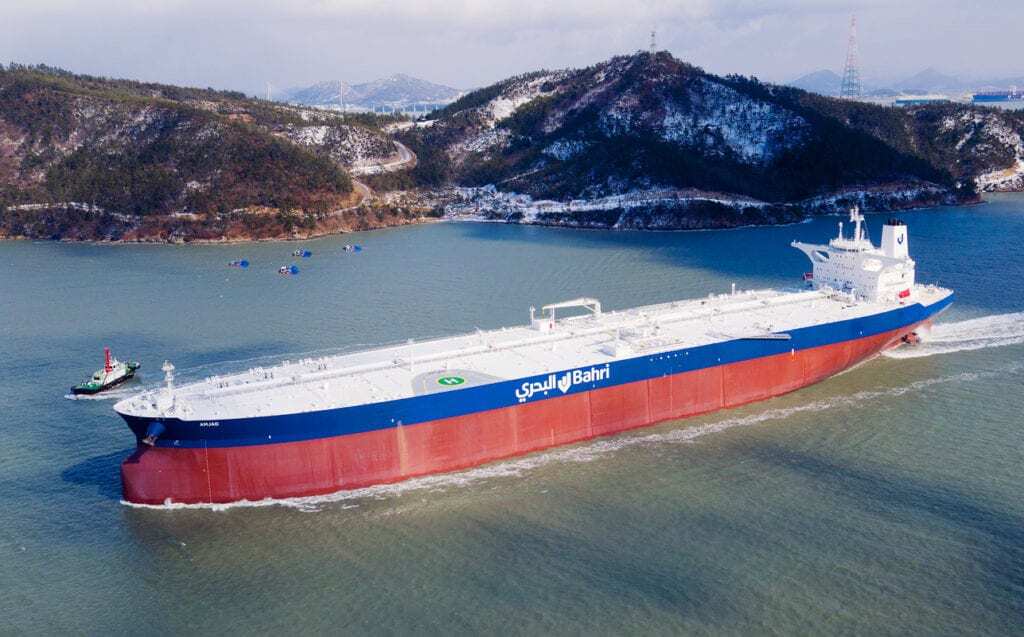
Could you elaborate on the types of vessels you are currently deploying within your service?
Bahri deploys six newly built state-of-the-art RoCoN vessels on fixed liner schedules serving the United States, North Europe and the Mediterranean, as well as to and from the Red Sea, the Arabian Gulf and India. This also involves feeder connections over key transshipment ports into the Upper Gulf, Horn of Africa, East and West Africa, Baltic States and Central and South America. The goal is to continue to serve these key markets whilst simultaneously exploring network expansion opportunities that may arise in the future. All vessels are equipped with heavy-lift cranes capable of handling lifts of up to 220 MT with cranes in tandem. Vessels are equipped with a 250-MT ramp with a door entry height of 6.8 m, and a total capacity for 330 TEUs, and 24,000 sqm. (approximately 55,000 cbm.) of cargo space.
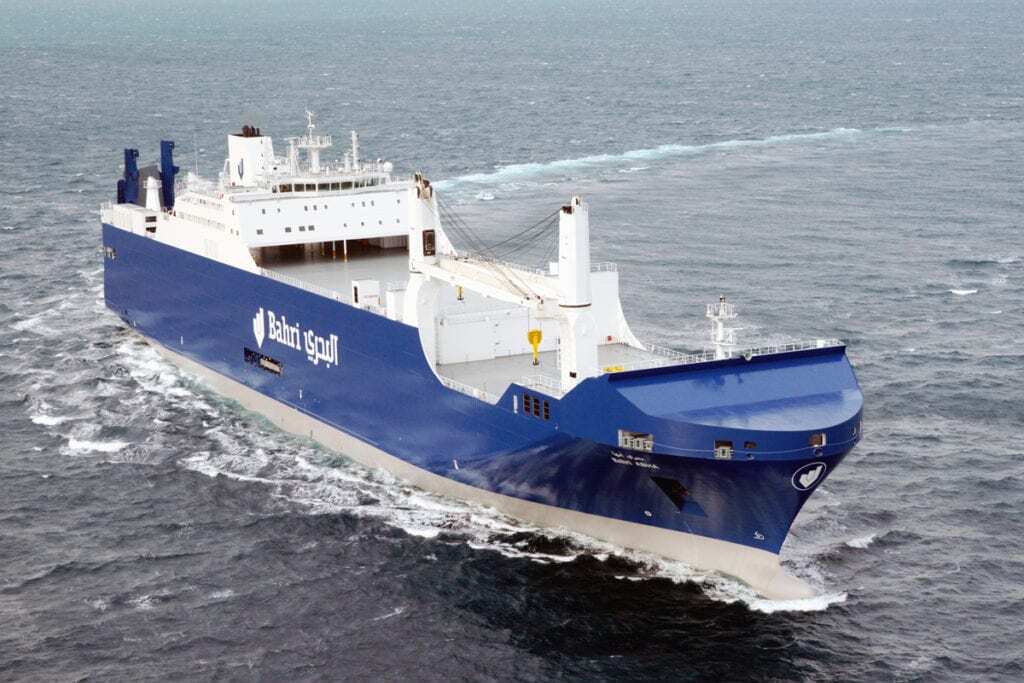
The company is dedicated to providing cutting-edge logistics solutions to a diverse set of clients, including equipment traders and manufacturers, construction companies, petrochemical and mining and metal, amongst others. Our end-to-end solutions oversee a broad range of activities including, but not limited to, factory-to-site turnkey project logistics services, route surveys and feasibility studies for large item transports, charting out risk assessments and mitigation plans, obtaining permits from regional authorities and carrying out customs clearance for a project.
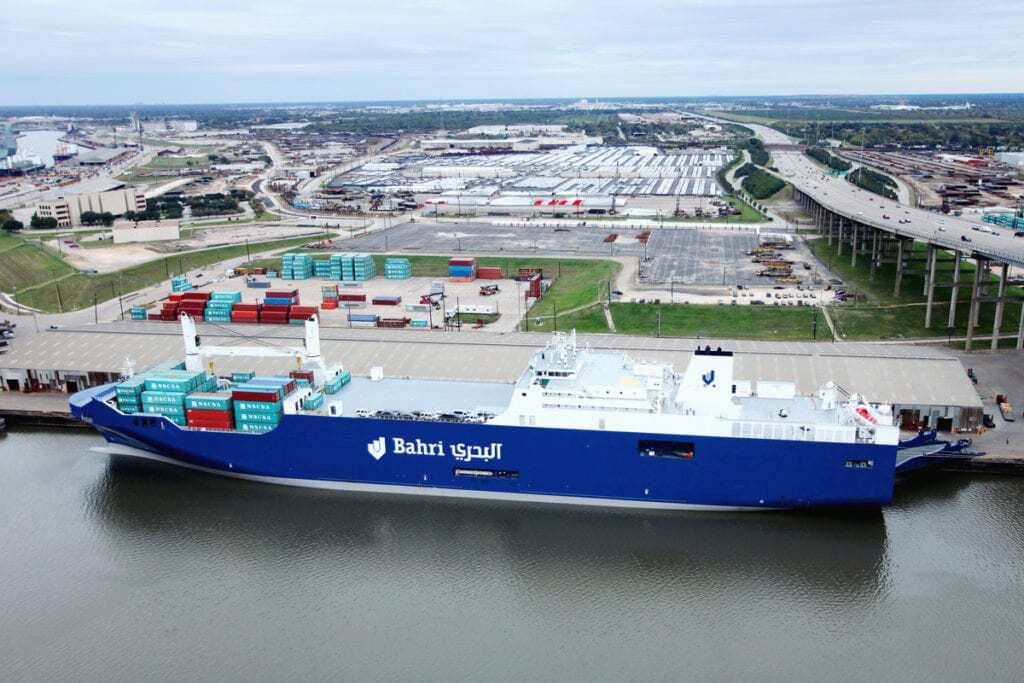
Do you operate your own container fleet? If so, do you provide all types of container equipment? Also, what is the average age of your vessels and what flag state do they belong to?
Bahri operates a fleet of owned and leased equipment, both containers and MAFI trailers, with a range of sizes and tonnage capacities including special equipment.
The average age of our RoCoN fleet is less than three years, and all Bahri-owned and operated RoCoN vessels fly under the flag of the Kingdom of Saudi Arabia, making us the only National Flag operator for the country.
Saudi Arabia is very large, with Riyadh as its capital. If cargos were destined for Riyadh, which entry port would be the most ideal for any potential customer to use? Is inland transport done by road or rail and can this be organised with Bahri through Bills of Lading? Also, does customs clearance take place in port or at an inland destination?
The two major entry ports and gateways for Riyadh are Jeddah and Dammam, whereas inland delivery can be carried out by rail or truck. While containers can be transported either by rail or road, out of gauge and project cargos move via the road network.
Cargos delivered using the rail network can be cleared at the Inland Container Depot (ICD) in Riyadh, while cargos transported via road must be cleared through customs at the port of entry. Bahri Logistics offers Through Bills of Lading (TBL) to Riyadh and can provide customs clearance and inland delivery to the site in Saudi Arabia with the help of our dedicated logistics department.
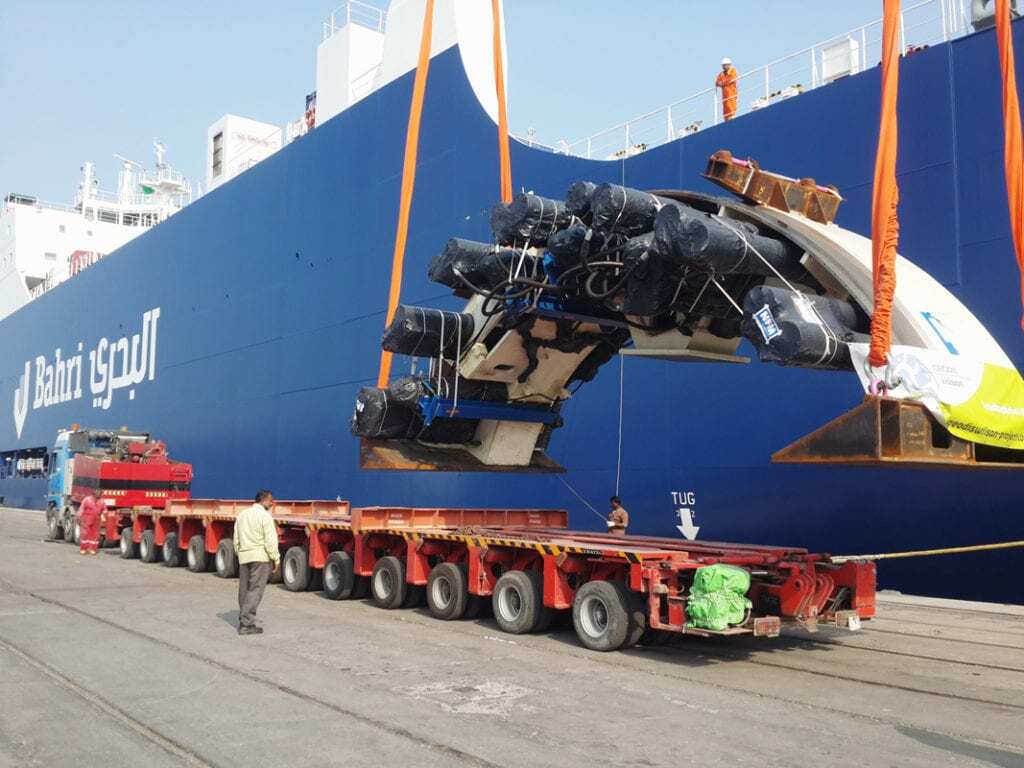
What are the main functions of Bahri Logistics?
Bahri runs a complete end-to-end logistics department that provides customs clearance and inland delivery to the site. In fact, we have been carrying out these functions for select clients over several years. Our focus is on providing complete logistics solutions, especially to government entities covered by the National Flag requirement.
Regarding the Saudi Vision 2030, local content will become a key driver in the decision-making process for providing local logistics solutions in the Kingdom, and as a prestigious organization, Bahri is expected to play an integral role in this process. We are prepared to assist global freight forwarders who are actively engaged in shipments either to or from Saudi Arabia.
Hypothetically, if a potential customer has a project in Saudi Arabia and the use of the Saudi flag is required but no Bahri vessels were available to lift the cargo, would Bahri be able to provide a solution through agreements with third-party carriers?
We have secured partnership agreements with other trusted carriers who have previously worked with us to ship cargos under the Saudi flag, either to or from the Kingdom and on routes and at times where our own tonnage was not available. Bahri is prepared for these situations, and we continue to nurture relationships with reliable third-party carriers on a regular basis so that our clients never face disruption in services.
Could you provide us with a few examples of project cargos you have handled, say from Northern Europe to the Middle East and/or from North America or the Mediterranean to the Middle East?
We have helped deliver large-scale consignments that were loaded from Europe and other parts and destined for the Middle East. Bahri serviced these projects by offering a variety of functions from its broad portfolio.
For the Barclay Mowlem Railway Project, Bahri arranged customs clearance for vessels setting out of various ports across Australia, USA, China, India, and other countries. We also undertook the transportation of these goods from Saudi ports to the project sites located across Saudi Arabia. The consignment included 8 locomotives, 90 hopper wagons, 10,000 RT BBK (Turnouts & Equipment), and 2,400 containers.
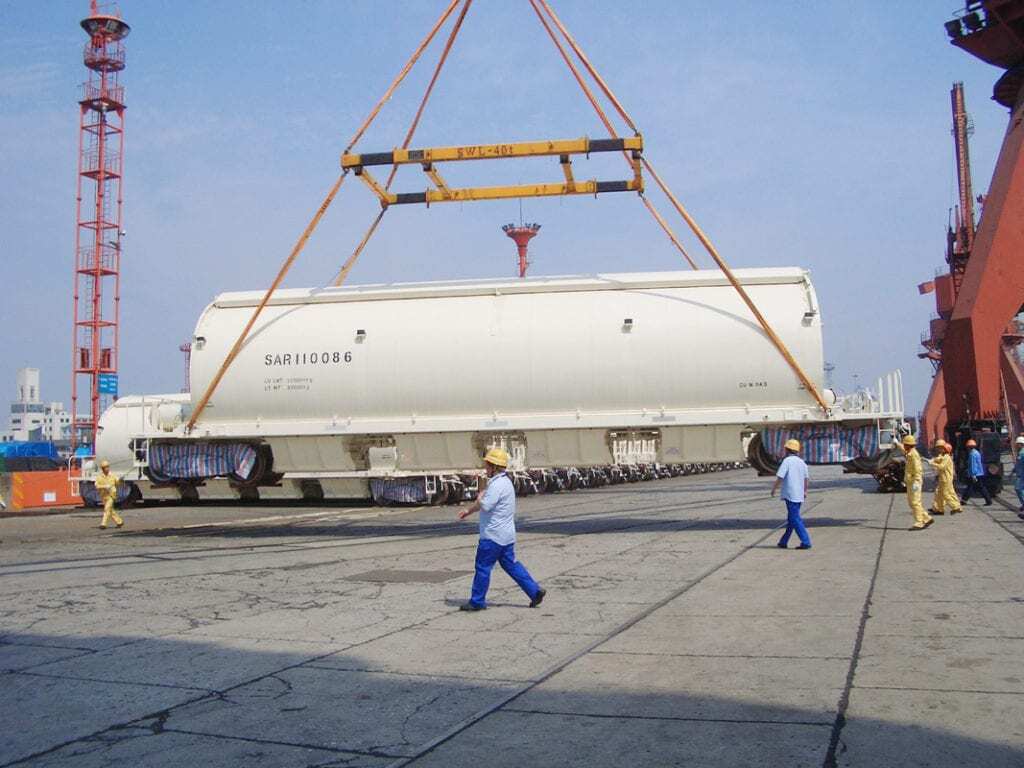
Bahri helped import specialized water desalination tanks and equipment for Saline Water Conversion Corporation (SWCC) and South Korean company Doosan. With a volume of 220,000 MT BBK and 1,500 TEUs, the shipment started off from various ports and docked at Ras Al Khair port in Saudi Arabia. Bahri’s services for this project included securing customs clearance and port handling.
Bahri also successfully executed a project for German company Kirow and Saudi Railway Company (SAR), where we undertook shipping, customs clearance, transportation and site offloading for large equipment – a telescopic rail-bound mobile crane weighing 410 FT. The consignment was loaded at Hamburg. Similarly, we handled a project on behalf of Spain-based Construcciones y Auxiliar de Ferrocarriles (CAF) and Saudi Railways Organization (SRO) where we shipped and offloaded 4 locomotives and 20 passenger cars from Bilbao in Spain to the Dammam Seaport in Saudi Arabia.
We also have ongoing projects, such as the Waad Al Shamal Phosphate Mining project for Greenbrier and Saudi Railway Company (SAR) that includes delivery of 1,200 acid tank wagons from Gdansk in Poland to Dammam over a two-year period. This was 100% owned and handled by Bahri’s own tonnage. We are also involved in the Riyadh Metro project, which is touted as the largest existing metro project in the world.
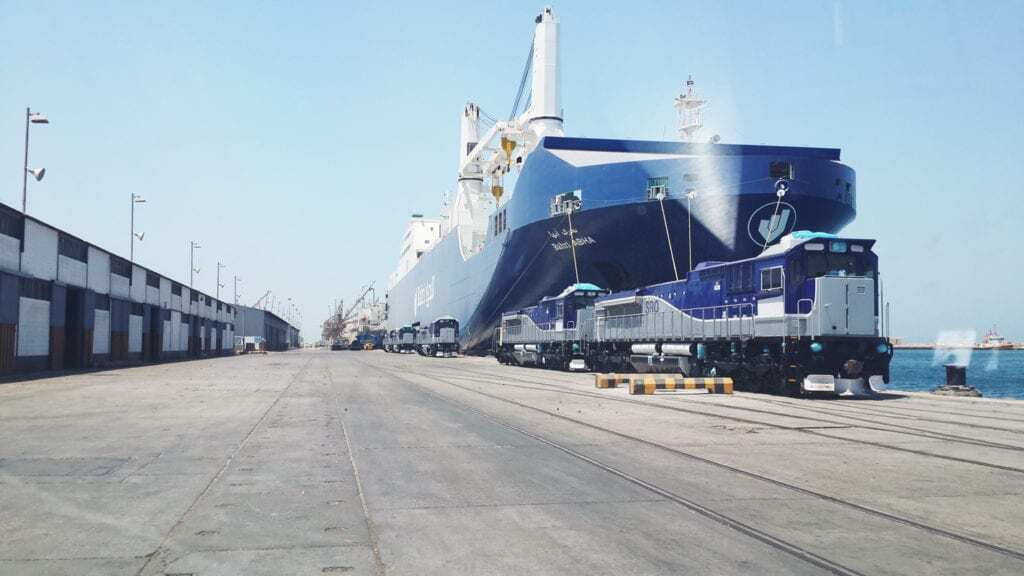
As we all know, shipping is very much a people business. Would you mind explaining to our readers about your own shipping experience prior to joining Bahri, Mr. Luckhurst? What made you choose shipping as a career path?
I bring over 18 years of global management experience in the container and breakbulk shipping industry, especially across the Middle East, Africa, and Asia. Prior to joining Bahri, I was working at the United Africa Feeder Line (UAFL) in Mauritius, where I first served as Commercial Manager and then went on to lead the development of the company’s long-term regional business feeder strategies from 2007 to 2015 as Managing Director. During this tenure, I also managed the commercial and operational aspects of the company’s multipurpose feeder operations within the region’s coastal trade routes. Before joining UAFL, I was appointed to the role of Area Route Manager / Director at Maersk K.K. in Japan, where I developed and managed the commercial and pricing strategy for the Northeast Asia region.
I did not actively seek out a career in shipping; I would say that I was drawn to it by chance. Let’s say then that the shipping industry chose me, and that since then I have never looked back. It has been a rewarding experience working and living in different corners of the globe, from Africa, Asia, and the Indian Ocean Islands countries to Europe, the United States, and the Middle East. Every day of my work brings a new challenge that I am always inspired to approach head-on. As someone recently remarked, “There is no sport like transport.”
Finally, in case our readers from other parts of the world wish to approach Bahri with concrete business freight inquiries, with whom should they make initial contact if they are located in:
Northern Europe
Bahri Logistics, Riyadh, Saudi Arabia – aykkara@bahri.sa
North America
Bahri America, Baltimore, United States – sblowers@bahri.sa
Asia
Bahri Mumbai, India – jiten@bahri.sa
The Mediterranean
Bahri Logistics, Riyadh, Saudi Arabia – aykkara@bahri.sa
Interviewee: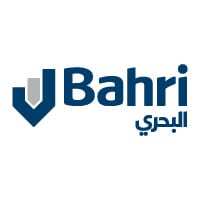
Matthew Luckhurst
Vice President – Liner
luckhurst@bahri.sa
Bahri
http://www.bahri.sa/

